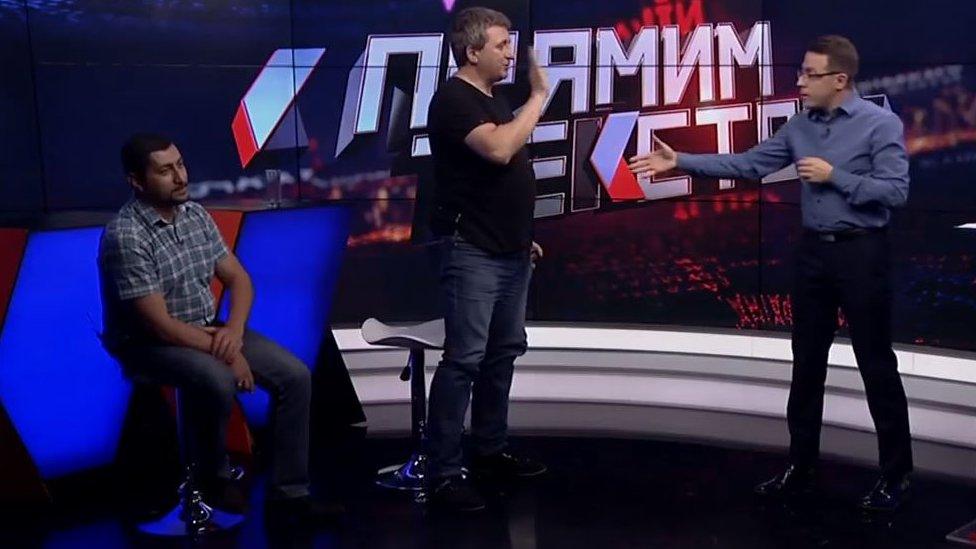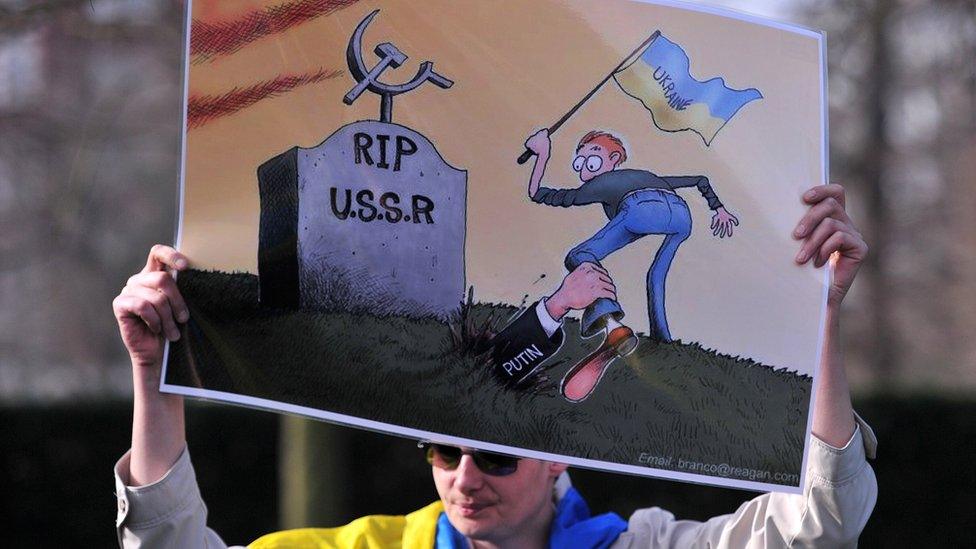TV guest quits show over request to speak Ukrainian
- Published

Political expert Yuriy Romanenko bids his host goodbye after refusing to speak Ukrainian
Russian may be widely spoken and understood in Ukraine but, such is the state of conflict between the two countries at the moment, its use is becoming a political act.
Yuriy Romanenko, a blogger and political expert, walked off the set of a live discussion show on Ukraine's Zik Television, external last week, when he was asked by the host, Ostap Drozdov, to speak Ukrainian instead of Russian.
"We agreed that [you would speak] Ukrainian," Mr Drozdov said, to which Mr Romanenko responded: "Let me speak the way I want to speak."
When Mr Drozdov insisted it was a matter of principle for him, as a "Ukrainian-speaking journalist who has a certain policy in his own programme", Mr Romanenko insisted he did not want to.
"OK, then I would like to ask you to leave this studio," said Mr Drozdov.
Mr Romanenko acceded, removing his microphone and shaking hands with his host before walking off the set.
'The shock of Russification'
Later, he said he had never promised to speak Ukrainian and recalled that the country's constitution protected people's right to use any language.
Writing on the Hvylya news website, external, of which he is editor-in-chief, Mr Romanenko said: "Laws, not strange criteria in the head of a presenter on any TV channel, set the framework for discussion." He accused Mr Drozdov of inventing his own laws and "covering them with patriotism".
Mr Drozdov also responded to the issue, external, writing on Tuesday that he was "amazed" by the number of people who had expressed their support and gratitude.
The incident reignited a recurring debate about the use of Russian in Ukraine that has continued for several days.

Ukraine's relations with Russia are complicated by its minority population of ethnic Russians
'Change people's consciousness'
One journalist at a rival station, Espreso TV, Bogdan Butkevych, external, criticised Mr Drozdov, saying it was more important to pay attention to what people say than the language they were speaking in.
Aleksander Smirnov, external, a creative director at a well-known advertising agency, called Mr Drozdov a "shame for journalism".
Others defended Mr Drozdov's stance though. Dmytro Simanskyy, external, a public relations expert, said he had his "full language support".
There should not be "a single word in Russian on television", Mr Simanskyy said, adding that this would "significantly change people's consciousness" in a couple of years.
War of tongues
Ukraine has been culturally tied to Russia for centuries and Russians make up the second largest ethnic group in the country - about a sixth of the population.
The use of Russian has become politically contentious in recent years.
In May, the Ukrainian parliament introduced language quotas for TV, stating that nationwide channels should have at least three-quarters of their content in Ukrainian - a move one television channel described as "violating the rights of millions of Ukrainian citizens whose native language is Russian".
Under the former pro-Russian President Viktor Yanukovych (2010-2014), parliament passed a law which gave Russian the status of a regional language in many areas.
It was bitterly criticised by pro-Ukrainian activists, who accused Mr Yanukovych and his party of trying to score points with Russia's President Vladimir Putin.
That law was abolished after the Euromaidan protests of 2013-14 in which Mr Yanukovych was ousted.
See also:
Reporting by Yuriy Martynenko
Next story: Armed guards for tomatoes in India as prices rise
Use #NewsfromElsewhere to stay up-to-date with our reports via Twitter, external.